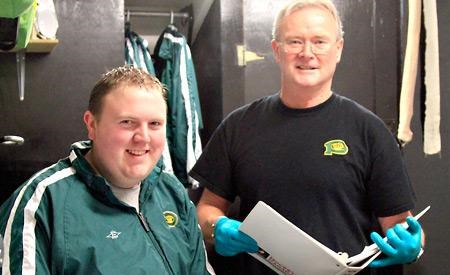Not every league, like the National Hockey League (NHL), has the money or resources to deal with the sport’s latest headache. Organizations like Powell River Kings or Powell River Minor Hockey Association are forced to deal with problems like concussions with few resources.
Kings do have highly qualified staff on the bench, and a doctor at all games, who are vigilant during the action and pro-active if a concussive situation occurs on the ice.
“My mentor is Denny Dyer,” said Pat Hurren. Powell River Regals’ long-time trainer. “always erred on the side of caution. In the old days though, we did use smelling salts and back into the game you went.” He admitted there was a lack of knowledge and “nowadays you don’t want to bring them to with smelling salts in case there is a neck injury involved. I don’t have smelling salts in my bag and I don’t want them.”
Hurren, who has a level one first aid ticket, assists Kings’ trainer Brendon Kerr who holds a recreation and leadership diploma from Lakehead University. He is qualified in sports rehabilitation and worked with a number of teams prior to the Kings.
“We follow Hockey Canada protocol and of course, with the NHL in the news, we watch what they do,” said Kerr. “Our doctor, Dr. [Steyn] Naude, is a huge resource. If it wasn’t for him I’m not sure what we would do.”
Holding up a brochure, Kerr explains, “We use Think First Canada’s concussion management sheet. We trust our players to come to us and then we watch them closely.”
BCHL does not provide protocol to its 16 teams but recently introduced a supplementary discipline program in an attempt to reduce head injuries and fighting.
“The supplement was introduced to make players aware of the dangers of blows to the head and dangerous hits,” said John Grisdale, BCHL commissioner. The program uses a cumulative system to assess fines and suspensions.
“You never want to take the intensity or reaction out of the game,” he explained, “but in our league last year we reduced our fighting by 100 per cent from 2009 to 2010.”
He added recognition issues around blows to the head and awareness in the league is higher, and accumulation numbers for those are falling. “So I think we’re in pretty good shape that way.”
Concussion protocol, Grisdale said, “needs to be managed through the teams. The league can’t mandate protocol because we can’t be there to monitor. There are minimum requirements for trainer qualifications and doctors and first aid at the games,” he said, “and all teams follow Hockey Canada’s return-to-play protocol.”
Powell River minor hockey’s president Pat Deveraux said his organization follows the guidelines set down by BCHL.
“We have a risk manager who is in charge of the [Vancouver Island] league of which we are a member,” he said, “and she gives us that protocol. It comes to me for distribution to our association and to our own risk manager, who is Leanne Beauregard.”
Deveraux fully understands the importance of a protocol from first-hand knowledge. “I’ve got a player who used to play on the rep team,” he said, “but now he plays in the house league, which is non-contact, because he’s had three concussions.
Players who have a concussion in Powell River need a doctor’s approval to go back on the ice. Most leagues do insist on that but politicians are stepping in to legislate changes that would make it law.
At the national level, Glenn Thibeault, New Democratic Party Member of Parliament for Sudbury, Ontario, is reintroducing a bill in Parliament to set up a concussion registry and national guidelines on how to handle head injuries. He would also like to see national training and educational standards for coaches and volunteers with cash incentives for organizations to use them.
In BC MLA Moira Stilwell, Vancouver-Langara riding, introduced a private member’s bill in November aimed at protecting young athletes after a concussion. It requires an athlete who suffers a concussion or head injury be removed from a competition and only be allowed to return after evaluation by a health care professional.
Both laws are meant to protect the athletes from themselves, parents, coaches and most of all each other.
This is the fourth in a series on concussions in hockey.



